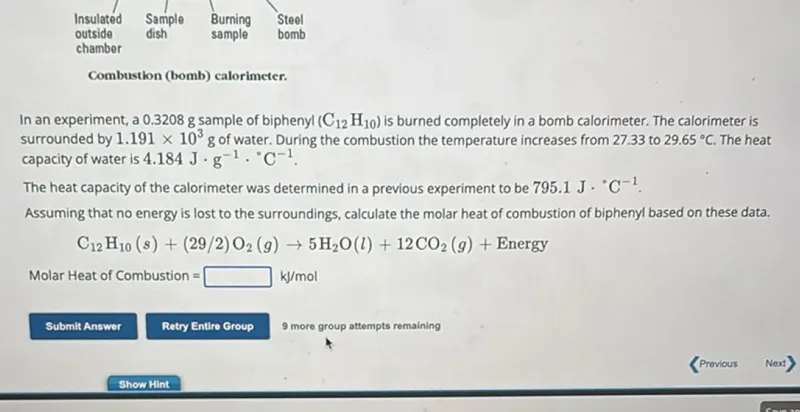Questions: In an experiment, a 0.3208 g sample of biphenyl (C12H10) is burned completely in a bomb calorimeter. The calorimeter is surrounded by 1.191 x 10^3 g of water. During the combustion the temperature increases from 27.33 to 29.65°C. The heat capacity of water is 4.184 J · g^-1 · °C^-1. The heat capacity of the calorimeter was determined in a previous experiment to be 795.1 J · °C^-1. Assuming that no energy is lost to the surroundings, calculate the molar heat of combustion of biphenyl based on these data. C12H10(s)+(29 / 2) O2(g) -> 5 H2O(l)+12 CO2(g)+ Energy Molar Heat of Combustion = kJ / mol

Transcript text: In an experiment, a 0.3208 g sample of biphenyl $\left(\mathrm{C}_{12} \mathrm{H}_{10}\right)$ is burned completely in a bomb calorimeter. The calorimeter is surrounded by $1.191 \times 10^{3} \mathrm{~g}$ of water. During the combustion the temperature increases from 27.33 to $29.65^{\circ} \mathrm{C}$. The heat capacity of water is $4.184 \mathrm{~J} \cdot \mathrm{~g}^{-1} \cdot{ }^{\circ} \mathrm{C}^{-1}$.
The heat capacity of the calorimeter was determined in a previous experiment to be $795.1 \mathrm{~J} \cdot{ }^{\circ} \mathrm{C}^{-1}$.
Assuming that no energy is lost to the surroundings, calculate the molar heat of combustion of biphenyl based on these data.
\[
\mathrm{C}_{12} \mathrm{H}_{10}(s)+(29 / 2) \mathrm{O}_{2}(g) \rightarrow 5 \mathrm{H}_{2} \mathrm{O}(l)+12 \mathrm{CO}_{2}(g)+\text { Energy }
\]
Molar Heat of Combustion = $\square$ $\mathrm{kJ} / \mathrm{mol}$





